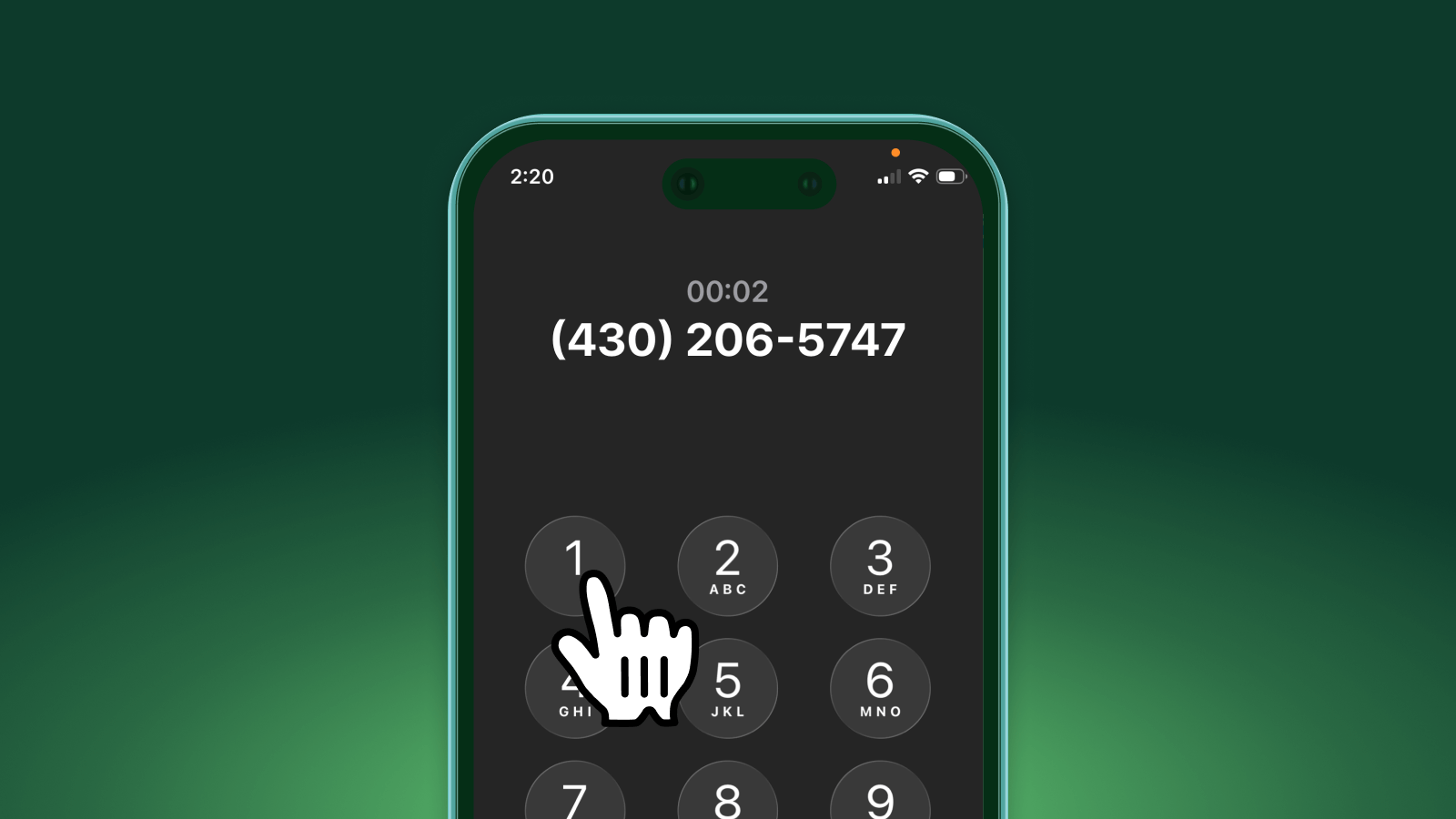- An answering service is essentially a third-party receptionist solution that answers calls for your business
- They make it easier to run your business by saving money, increasing your availability, and capturing more leads
- Many industries use answering service every day in their operation, from roofing contractors to insurance agencies
Imagine you’re trying to manage phone calls, emails, projects, and customer questions all at once—while also trying to run your business. It’s overwhelming, right? That’s where an answering service comes in.
In this post, you’ll discover exactly how an answering service works, why it matters, and how to choose the perfect fit for your company. We’ll cover everything from basic definitions to industry-specific use cases, so by the end, you’ll be ready to make an informed decision that frees you up to focus on what you do best.
What is an answering service?
At its core, an answering service is a third-party solution that handles incoming calls on behalf of your business. Instead of making customers wait for voicemail or missing calls outside office hours, a live person or automated system answers, captures essential details, and routes messages where they need to go.
How do answering services work?
Answering services fit right into your business’s call handling flow. When a customer calls you, they’ll always be greeted by someone who sounds like a member of your team. They can be set up to take every call 24/7, or just the ones that you miss—so no one gets left in voicemail.
1. Calls are routed to an answering service when people call your business number
When someone dials your business number, the call is forwarded to the answering service. Depending on your setup, it might go to a virtual receptionist or an IVR menu.
2. The answering service agent greets the customer
If you go the receptionist route, then they’ll greet the customer with a friendly greeting message that sounds like your company. The agent or system then asks how they can help the customer, and asks qualifying questions—think purpose of call, project details, or basic contact info.
3. The agent takes messages, books appointments, and more
Answering services are designed to work with your customized call flow—they’ll help book appointments, qualify leads, and capture information that’s important to you (caller name, reason for calling, urgency, etc). You receive a summary via email, SMS, or a dedicated dashboard. Some services offer real-time push notifications.
4. Transfer the call, if necessary
If necessary, calls can be transferred directly to on-call staff or scheduled for a callback. That way, urgent issues get pounced on immediately.
5. Review the call recording, transcript, and analytics any time
Most services provide dashboards showing call volume, response times, caller satisfaction metrics, and call recordings—helping you spot trends, optimize your customer experience, and make sure calls are going the way you want them to.
How does an answering service make it easier to run my business?
Many businesses rely on call handling for customer service and earning new customers—all so they can grow their business. But whether you’re a one-man operation or have a team working with you, answering every single call isn’t always manageable.
Here’s how businesses benefit every day from a good call handling service:
Save money
- Cost-effectiveness: Hiring a full-time receptionist can cost $30,000–$40,000 per year plus benefits. A traditional answering service with human agents often runs $200–$600 monthly, while AI virtual receptionists may cost $25-100 monthly.
- No overhead: You avoid expenses related to office space, equipment, and training.
Answer every call, at any hour
- 24/7 availability: Never miss a call, even on weekends, holidays, or during spikes in volume.
- Scalable support: Whether you get five calls or five hundred, the service adjusts without you scrambling for temp staff.
Eliminate phone call distraction and focus on core work
- Focus on core tasks: Your team can dedicate their energy to sales, projects, client work, and other laborious tasks—rather than answering non-core calls.
- Reduced interruptions: Smooth call handling from an answering service means fewer distractions for you, but still ensuring your callers can get the answers they need and book your services.
Easily qualify and capture leads
- Consistent follow-up: A good answering service helps capture the information that you want from callers and logs every detail, so no lead slips away.
- Higher conversion: Faster response increases the likelihood that prospects convert into customers. In fact, conversion rates are 8x higher for response times within 5 minutes.
Better experience for customers
- Professional first impression: Branded greetings and courteous agents set the right tone from the start. Think about it—as a customer, would you feel better about a company if you reached a voicemail or a helpful voice instead?
- Personalized service: Agents follow your custom guidelines, so callers get the specific information they need.
What are the different types of answering services I should know about?
Before you get off to the races in researching for an answering service, it’s good to know what types you might see on the web:
- Digital answering services
- What it is: Web-based platforms combining live agents with text, email, and app notifications. (Think chatboxes that you see on some websites).
- Best for: Businesses that want multi-channel messaging for their consumers. Having many points of contact can result in improved service for customers.
- What it is: Web-based platforms combining live agents with text, email, and app notifications. (Think chatboxes that you see on some websites).
- Automated/IVR services
- What it is: Pre-recorded menus and phone prompt systems guide callers to self-serve options. I know you’ve heard this one before: “Press 1 for store hours, press 2 to speak to a representative…”.
- Best for: High-volume, routine inquiries (e.g., bank hours, account balances).
- What it is: Pre-recorded menus and phone prompt systems guide callers to self-serve options. I know you’ve heard this one before: “Press 1 for store hours, press 2 to speak to a representative…”.
- Virtual receptionist services
- What it is: Trained receptionists handle complex calls, schedule appointments, and even upsell.
- Best for: Professional services (law firms, medical practices) needing assistance with complex issues.
- What it is: Trained receptionists handle complex calls, schedule appointments, and even upsell.
- AI answering services
- What it is: AI-powered, human-like virtual receptionist service that can do almost everything a traditional one does, such as handle FAQs, book appointments, gather lead info, and route calls—but more affordably.
- Best for: Small businesses and professional services looking for a way to affordably answer calls and handle customer intake.
- What it is: AI-powered, human-like virtual receptionist service that can do almost everything a traditional one does, such as handle FAQs, book appointments, gather lead info, and route calls—but more affordably.
- Call center services
- What it is: Large-scale operations handling both inbound and outbound calls, often for support or sales campaigns.
- Best for: Enterprises needing high-volume support or telemarketing.
- What it is: Large-scale operations handling both inbound and outbound calls, often for support or sales campaigns.
Which one is the right fit for my business?
Everyone runs their business differently. When it comes to choosing the right answering service for your business, it’s important to ask yourself what you’ll need from one. Here’s a list to get you on your way:
What’s my typical call volume and peak times?
Gauge how many calls you get daily—and when—to ensure the service can scale up or down without long hold times.
Do I need software integrations?
List your must-have integrations (CRM, helpdesk, calendar, SMS alerts) so messages and leads flow straight into your existing workflows. This helps eliminate a lot of manual work for you.
What’s my budget and preferred pricing model?
Compare per-minute vs. per-call vs. flat-fee plans, and factor in any setup or overage fees to find the most cost-effective fit.
What hours of coverage do I really need?
Determine if you need 24/7 support, just after-hours coverage, weekend backup, or overflow reception service during busy periods—so you’re never paying for unused time.
Tip: If you’re a small business worried about cost but want reliable coverage and need help answering calls, start with an AI answering service like Upfirst. We help our clients every day answer calls, book appointments, and gather lead information—we’ll send you call summaries and transcripts via SMS/email instantly after every call.
What industries use answering services every day?
Here’s a glimpse at what industries use answering services to help run their business:
- Healthcare & medical practices
- Legal & law firms
- Real estate agencies
- Property management
- Home services (plumbing, HVAC, electrical, roofing, etc)
- Financial services & accounting
- IT & tech support
- E-commerce & retail
- Nonprofits & associations
- Travel & hospitality
- Professional consulting
- Auto & dealerships
- Insurance agencies
- Veterinarians
- Locksmith
- And much more
How do companies typically use answering services?
Here are common use cases:
- Message-taking service: Capture detailed messages when staff are busy or offline.
- Lead qualification service: Agents ask your specific questions, gathering important lead information
- Call transfers: Route urgent or specialized calls directly to the right person.
- After-hours answering service: Provide emergency on-call coverage or simply a friendly voice at night.
- Appointment scheduling service: Calendar integrations allow agents to book meetings in real time.
- Order taking service: Agents take down orders or payment details securely.
- Call summaries & transcripts: Detailed reports and recordings for quality control and staying up-to-date on calls.
- Bilingual answering service: Answer calls in English, Spanish, and more for those businesses that serve a diverse clientele.
Important to consider: For many answering services, many of these features can be add-ons. If your business needs things like 24/7 answering, appointment scheduling, or bilingual support, read the fine print and be prepared to pay a little extra for those services.
With an AI phone answering service like Upfirst, you can get access to those features without having to pay extra. They come as a part of the base pricing plan.
Conclusion
Picking the right answering service isn’t just about fielding calls—it’s about creating a reliable extension of your team that keeps customers happy and prospects engaged. By understanding call answering needs, you’ll land on a solution that fits your workflow and budget. Whether you opt for AI or live agents, the right partner will free you up to focus on growing your business. Trust the process, lean on trial periods to test the fit, and you’ll soon see how an answering service can help your business run more smoothly.
Nick Lau is a copywriter and content lead for Upfirst.ai. A self-starter at heart, he dove into marketing in 2015 by launching an e-commerce company, selling private-labeled products on Amazon and Shopify. When he’s not crafting copy, you might spot him on a winding road trip to the coasts or through forests, in search of unexplored places.








